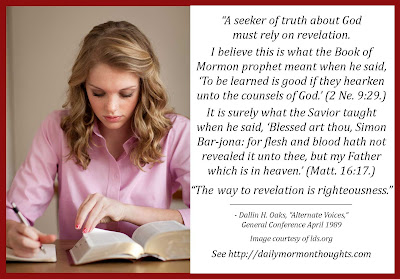"If we sincerely desire and strive to measure up to the high expectations of our Heavenly Father, He will ensure that we receive all the help we need, whether it be comforting, strengthening, or chastening. If we are open to it, needed correction will come in many forms and from many sources. It may come in the course of our prayers as God speaks to our mind and heart through the Holy Ghost (see D&C 8:2). It may come in the form of prayers that are answered no or differently than we had expected. Chastening may come as we study the scriptures and are reminded of deficiencies, disobedience, or simply matters neglected.
"Correction can come through others, especially those who are God-inspired to promote our happiness. Apostles, prophets, patriarchs, bishops, and others have been put into the Church today, just as anciently, 'for the perfecting of the saints, for the work of the ministry, for the edifying of the body of Christ' (Ephesians 4:12)....
"All of us can meet God's high expectations, however great or small our capacity and talent may be. Moroni affirms, 'If ye shall deny yourselves of all ungodliness, and love God with all your might, mind and strength, then is [God's] grace sufficient for you, that by his grace ye may be perfect in Christ' (Moroni 10:32). It is a diligent, devoted effort on our part that calls forth this empowering and enabling grace, an effort that certainly includes submission to God's chastening hand and sincere, unqualified repentance. Let us pray for His love-inspired correction."
- D. Todd Christofferson, "As Many as I Love, I Rebuke and Chasten," Ensign, May 2011, pp. 97-100
Click here to read the full talk
It's an unusual person in today's world who is eager for correction. But it's perhaps a real sign of spiritual maturity. We believe that "whom the Lord loveth he chasteneth" (Heb. 12:6) since that is a step in learning, repentance, and growth. We truly should be eager for those experiences, knowing the good they can bring to us!
The truly humble and sincere disciple will be praying for "His love-inspired correction" and will respond whole-heartedly by making changes and seeking to do better. "Lord, what wilt thou have me to do?" (Acts 9:6).
(Compilation and commentary by David Kenison, Orem, Utah, 2022)
April 7, 2016
April 7, 2016































